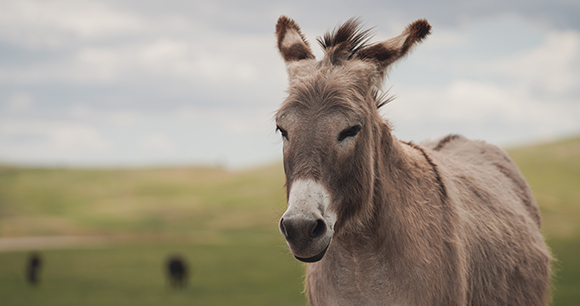
The bipartisan Ejiao Act would prohibit the transport, sale, and purchase within the United States of products containing ejiao and of donkeys and donkey hides for the production of ejiao.
Ejiao, a gelatin produced from boiled donkey hides, is used in traditional Chinese medicine and cosmetics. Soaring demand for this product in recent years has decimated China’s donkey population and is now imperiling donkey populations around the world. It has spurred a cruel global trade that causes tremendous suffering to the animals involved and severely impacts communities that rely on donkeys. Donkeys are being stolen, transported long distances without food or water, and killed under inhumane and unsanitary conditions.
While mainland China and Hong Kong account for much of the demand, the United States is the third largest importer of products containing ejiao, with approximately $12 million in annual imports.1 The Ejiao Act would ensure that the United States no longer supports this inhumane trade, thereby setting a strong precedent for other nations to help shut down this market.
Background
Ejiao is touted as a substance offering wide-ranging health and medicinal benefits—as a way to prevent miscarriage, treat circulatory issues, and arrest premature aging, to name but a few. None of the myriad claims, however, are supported by rigorous clinical trials.2
Previously produced in limited quantities for China’s elite, ejiao is now marketed to a burgeoning Chinese middle class. Booming demand has caused prices to skyrocket: One report estimates that over a 10-year period, the cost of 500 grams of ejiao increased from 100 yuan (~$14) to 2,986 yuan (~$410).3 By one estimate, 4.8 million donkeys are now being killed each year to meet demand.4
China’s donkey population has rapidly dwindled as a result—plummeting from 9 million to 2 million between 1997 and 2018.5 To compensate, Chinese producers have turned to imports from Africa, the Americas, and other parts of Asia. Targeted countries are now seeing substantial declines in their own donkey populations. One such country, Botswana, has seen its donkey population decline by half since 2016.6
Donkeys are an integral and substantial part of life in many communities around the world, and their loss is keenly felt. They transport people and goods to markets, schools, and health clinics. In such communities, women in particular rely on working donkeys to reduce the burden of physical labor and support economic independence.
To prevent further depletion of a critical economic and cultural resource, a number of African countries—including Kenya, Botswana, Uganda, Tanzania, Niger, Ethiopia, Burkina Faso, Mali, and Senegal—have banned or restricted the trade of donkeys or skins for ejiao.7 But even in these countries, skyrocketing demand and rising prices continue to fuel an illicit underground trade. In February 2024, the African Union instituted a moratorium on the slaughter of donkeys for their skins, taking a significant step toward addressing the trade devastating the donkey population continent-wide. However, this ban must be enforced independently by each nation, and consistent implementation could be a challenge.
Donkeys sacrificed to the ejiao trade experience extreme cruelty. Many are transported hundreds of miles under horrendous conditions without food, water, or rest. A report by The Donkey Sanctuary found that in some transports, up to 20 percent die before reaching the slaughterhouse. Traders care only about the hides, and with no oversight, there’s little incentive to provide care during transport. Donkeys are commonly killed in the “bush” and bludgeoned with a hammer before their throats are slit.8 For those who do survive the journey, death at the slaughterhouse is neither quick nor painless. Severe welfare problems have been extensively documented at these facilities, with footage of donkeys arriving with open wounds, being beaten, dragged by their ears and tails, and subjected to unsuccessful stunning attempts prior to slaughter.9 Both the American Veterinary Medical Association and the American Association of Equine Practitioners have condemned the trade in donkey skins, noting the abysmal treatment of these animals in transport and at slaughter.
In addition to declining populations and significant welfare concerns, the ejiao trade presents biosecurity risks. Questionable slaughter practices and densely packed animals in unsanitary conditions increase the risk of zoonotic disease transmission. Donkeys are stoic by nature—predisposed not to broadcast evidence of illness or distress. Diseased animals, therefore, may go undetected and trigger infections that could spread over an enormous network of animals and people.
The Solution
The Ejiao Act would prohibit the transport, sale, and purchase within the United States of ejiao products and of donkeys and donkey hides for the production of ejiao. Penalties under the bill mirror those under the Lacey Act—widely regarded as one the strongest federal laws in the United States for protecting species from illegal trade and exploitation.
Ejiao production entails severe animal welfare concerns and health and safety issues, and threatens to decimate populations of these trusted animals who are so integral to communities across the world. Passage of the Ejiao Act would ensure that the United States no longer supports this cruel, destabilizing, and dangerous trade.
1. American Association for Equine Practitioners, AAEP Announces Support of Federal Legislation to Protect Donkeys by Banning the Sale of Ejiao (2021). Available: aaep.org/news/aaep-announces-support-federal-legislation-protect-donkeys-banning-sale-ejiao
2. Science, Chinese trade in hides has led to global donkey massacre (2021). Available: science.org/content/article/chinese-trade-hides-has-led-global-donkey-massacre
3. China Daily, Makers of lucrative TCM cast net wider for future success (2018). Available: chinadailyhk.com/articles/70/46/20/1522213575874.html
4. The Donkey Sanctuary, The Donkey Skin Trade (2023). Available: thedonkeysanctuary.org.uk/end-the-donkey-skin-trade
5. Norris SL, Little HA, Ryding J, Raw Z, Global donkey and mule populations: Figures and Trends (2021). Available: ncbi.nlm.nih.gov/pmc/articles/PMC7906361/
6. South African Institute for International Affairs, China, Africa and the Market for Donkeys: Keeping the Cart Behind the Donkey (2023). Available: saiia.org.za/wp-content/uploads/2023/01/SAIIA_OP-339_ChinaAfricaDonkeys.pdf
7. Ibid.
8. The Donkey Sanctuary, Under the Skin (2019). Available: thedonkeysanctuary.org.uk/sites/uk/files/2019-11/under-the-skin-report-revised-2019.pdf
9. Ibid.